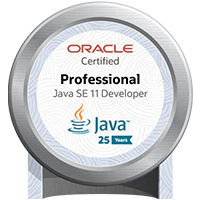
Java is celebrating 25 years of existence.
I discovered the anniversary offer to certify for Java SE 11 Developer.
This special certification has a cool logo with the remainder of the Java 25-year anniversary.
Oracle offers this certification for only 25 dollars [1] and provides free access to their learning platform.
The offer and logo availability are time-limited.